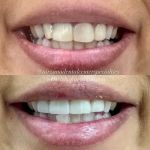- 1 - Understanding-tooth-enamel-and-its-importance
- 2 - How-diet-affects-enamel-health
- 3 - Foods-rich-in-calcium-and-phosphorus
- 4 - Role-of-vitamin-d-and-other-nutrients
- 5 - Benefits-of-dairy-products-and-vegetables
- 6 - Real-life-success-stories
- 7 - Practical-tips-for-enamel-repair-through-diet
1. Understanding Tooth Enamel and Its Importance
Tooth enamel is the hard, outer layer protecting your teeth from decay, temperature sensitivity, and physical damage. Though it is the strongest substance in the human body, enamel can wear down over time due to acids, sugary foods, and poor oral hygiene. Once lost, enamel cannot regenerate naturally, but it can be remineralized and strengthened.
This is why maintaining enamel health is crucial for overall dental wellness. Understanding how tooth enamel functions and the factors that harm it sets the foundation for discovering effective foods that help rebuild tooth enamel.
2. How Diet Affects Enamel Health
Your diet plays a pivotal role in enamel maintenance and repair. Acidic foods and beverages, like soda and citrus, can erode enamel, while certain nutrients promote remineralization by replenishing lost minerals. Consuming foods rich in calcium, phosphorus, and vitamins supports the natural repair processes of your teeth.
Scientific studies show that a balanced diet not only improves general health but also directly impacts oral health by enhancing the mineral content of saliva, which bathes and protects tooth surfaces.
3. Foods Rich in Calcium and Phosphorus
Calcium and phosphorus are essential minerals for enamel remineralization. Dairy products such as milk, cheese, and yogurt provide abundant calcium and phosphorus that help restore tooth enamel.
For example, eating a slice of cheese after a sugary snack can neutralize acid in the mouth and supply minerals to strengthen teeth. Leafy greens like kale and spinach also offer these minerals along with additional vitamins beneficial for dental health.
4. Role of Vitamin D and Other Nutrients
Vitamin D is vital for calcium absorption and bone health, including teeth. Without adequate vitamin D, calcium from your diet cannot be effectively utilized to repair enamel.
Other nutrients such as vitamin K2 and fluoride contribute to enamel strength and protection. Fluoride, often found in tap water and dental products, helps rebuild weakened enamel and prevent decay.
Ensuring a nutrient-rich diet supports the complex interplay necessary for enamel repair.
5. Benefits of Dairy Products and Vegetables
Dairy products not only supply calcium and phosphorus but also increase saliva production, which neutralizes harmful acids and aids remineralization. Vegetables like broccoli and carrots stimulate saliva and provide vitamins A and C, which promote healthy gums and tissues supporting teeth.
A story shared by a patient at Dentistry Toothtruth revealed that incorporating more raw vegetables and cheese into her diet significantly improved her enamel sensitivity and overall oral health, demonstrating practical benefits of these foods.
6. Real-Life Success Stories
Jessica, a 35-year-old mother, noticed increased tooth sensitivity and enamel wear after frequent soda consumption. After consulting dental professionals and modifying her diet to include more enamel-strengthening foods such as yogurt, leafy greens, and almonds, she observed notable improvements in sensitivity and enamel appearance.
Her experience underscores how dietary changes can make a real difference in rebuilding tooth enamel and preventing further damage.
7. Practical Tips for Enamel Repair Through Diet
To help rebuild tooth enamel, consider the following practical tips:
1. Incorporate calcium-rich foods like dairy or fortified plant milks daily.
2. Eat phosphorus-containing foods such as nuts, meat, and eggs to complement calcium absorption.
3. Ensure adequate vitamin D through sunlight exposure, supplements, or foods like fatty fish.
4. Limit acidic and sugary foods that accelerate enamel erosion.
5. Maintain proper hydration to support saliva production, which protects enamel.
6. Include crunchy vegetables and cheese in meals to stimulate saliva and provide protective minerals.
By combining these dietary habits with good oral hygiene, you can support your teeth’s natural repair processes and maintain a healthy smile.
For personalized advice and access to products that support enamel health, visit Dentistry Toothtruth to explore tailored recommendations and trusted dental care solutions.







 Cherry Valley Dental4.0 (115 review)
Cherry Valley Dental4.0 (115 review) Main Street Dental Group and Orthodontics4.0 (238 review)
Main Street Dental Group and Orthodontics4.0 (238 review) Mountainside Dental Group - Rancho Santa Margarita4.0 (117 review)
Mountainside Dental Group - Rancho Santa Margarita4.0 (117 review) Shahin Shamsian DDS2.0 (17 review)
Shahin Shamsian DDS2.0 (17 review) Gannett Drive Dental4.0 (63 review)
Gannett Drive Dental4.0 (63 review) Daniel Jeffrey Cohen, DDS5.0 (117 review)
Daniel Jeffrey Cohen, DDS5.0 (117 review) The Importance of Oral Health Education During Pregnancy for a Healthy Pregnancy
The Importance of Oral Health Education During Pregnancy for a Healthy Pregnancy Best Tips for Brushing Your Teeth Properly for Healthy Gums: Essential Techniques for Oral Health
Best Tips for Brushing Your Teeth Properly for Healthy Gums: Essential Techniques for Oral Health Why Skipping Dental Checkups Can Lead to Bigger Oral Health Problems
Why Skipping Dental Checkups Can Lead to Bigger Oral Health Problems Advantages of Porcelain Dental Restorations
Advantages of Porcelain Dental Restorations How Can Diabetes Cause Tooth and Gum Problems? Preventing and Managing Oral Health Issues
How Can Diabetes Cause Tooth and Gum Problems? Preventing and Managing Oral Health Issues Healthy Habits for Promoting Good Oral Health and Hygiene: Tips for a Healthy Smile
Healthy Habits for Promoting Good Oral Health and Hygiene: Tips for a Healthy Smile